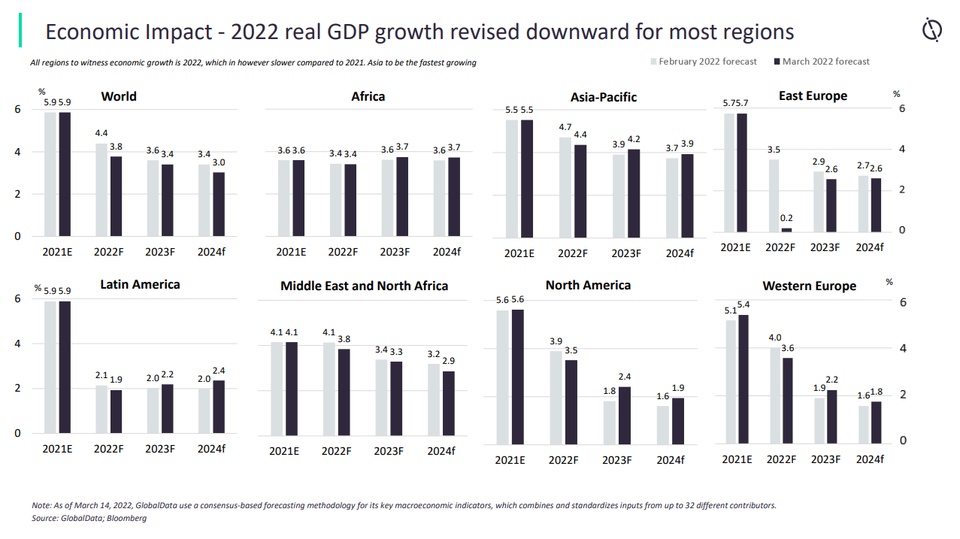Ukraine crisis briefing
Powered by
Download GlobalData’s Ukraine Crisis Executive Briefing report
- ECONOMIC IMPACT -
Latest update: 15 March
GlobalData forecasts that the world economy will grow at a slower pace of 3.8% in 2022 following a 5.9% growth in 2021. On the other hand, the global inflation rate is projected to rise to 5.6% in 2022 from 3.5% in the previous year due to supply chain disruption amid the Ukraine-Russia war.
Following Russia's invasion of Ukraine, prices of oil and natural gas skyrocketed and put upward pressure on the already high inflation rate. GlobalData revised its real GDP growth forecast downward for the regions. Real GDP growth for Asia-Pacific has been revised downward by 0.4%, East Europe by 3.3 pp, Western Europe by 0.4% and North America by 0.4% in March 2022 compared to its earlier projections.

- SECTOR IMPACT: TRAVEL AND TOURISM -
Latest update: 15 March
Revenue impact
Airlines across the globe will continue to be financially impacted by the crisis for as long as it continues. The EU and the UK have already imposed a blanket travel ban on Russian aircraft using their airspace, and Russia has responded with like for like restrictions.
Many European airlines will now have to take longer routes to avoid flying over Russia. This requires more fuel, which is now costing considerably more.
Oil prices have surged and are expected to rise even further. Air France-KLM stated that the outbreak of a full-scale conflict would put tremendous pressure on oil prices and will likely disrupt the group’s plans for recovery this year.
Due to the ripple effect of this conflict, an increasing number of sectors connected to travel and tourism will be impacted. The Russian hospitality industry experienced a strong rebound in 2021, driven by domestic visitation, but the current conflict means anticipating when international tourists will fully return to Russian hotels will be difficult.
The financial outlook for many Russian hotels already looks bleak, with the cancellation of major events in the nation acting as a sign of things to come.
Travel enters a new era
Low tourist demand means many cars rental companies have been forced to sell their fleets in order to stay afloat during the Covid-19 pandemic.
Markets in which airport pickup is the largest channel, such as the US, have particularly suffered, but the effect has been felt all over the world.
But as demand picks up, with more people traveling and supply still down, major price hikes are likely to be in store for anyone who wants to rent a car.
Key Travel And Tourism developments
SANCTIONS
Due to sanctions, Russia’s flagship airline Aeroflot has announced the halt of all its international flights, except to Belarus, and the country’s second-biggest airline, S7, has also suspended its international flights.
Many non-Russian airlines are having to take diversions to avoid flying through Russian airspace, with some European companies cancelling their flights to Asia altogether. Finnish airline Finnair had initially cancelled its flights to Japan, China, and South Korea but has since resumed its journeys to Seoul, Tokyo, and Shanghai, taking routes that avoid Russian airspace.
DEMAND DISRUPTION
Travel enters a new era
Low tourist demand means many cars rental companies have been forced to sell their fleets in order to stay afloat during the Covid-19 pandemic.
Markets in which airport pickup is the largest channel, such as the US, have particularly suffered, but the effect has been felt all over the world.
But as demand picks up, with more people traveling and supply still down, major price hikes are likely to be in store for anyone who wants to rent a car.
Cyprus's tourism industry will take a hit from the crisis. Michalis Antoniou, the president of the Cyprus Employers and Industrialists Federation, stated in the Cyprus Mail that the closure of Cypriot airspace to Russia will harm the country's tourism industry and any sanctions imposed on Russia will also impact Cyprus’s economy, as high levels of Russian foreign direct investment is channelled
through Cyprus.
Turkey will be heavily impacted by the crisis. Ukraine and Russia are important source markets for Turkey. In 2021, they created a combined 4.9 million visits to Turkey, which was 36% of the total visits from its top 10 inbound source markets.